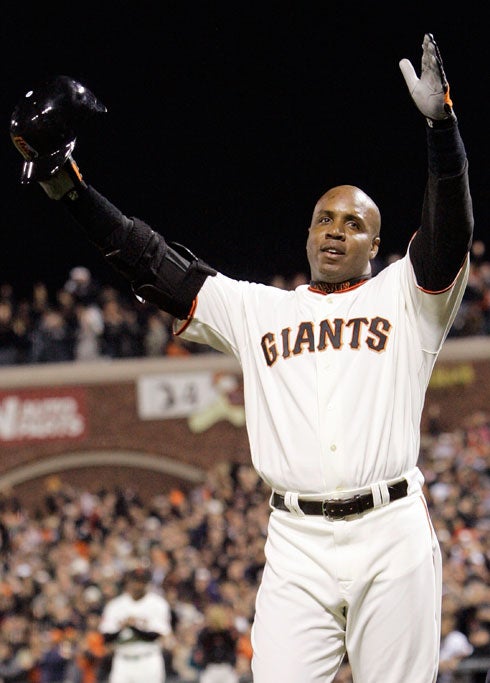Baseball on home run to the truth with Bonds' indictment

Baseball's shame, baseball's ultimate disgrace? Anything but. The indictment last week of Barry Bonds, the most celebrated player of his era, for lying to a federal grand jury over whether he knowingly used steroids, may be the best thing that's happened to the sport in 20 years.
For those of you who do not follow America's beautiful game, imagine that the feats of Alex Ferguson and Arsène Wenger over the past decade had been due not to their ability to coax the very best out of great players, but their fuelling of those players with performance-enhancing drugs, unavailable to their rivals. The entire history of the Premiership would have to be rewritten.
Thus, more or less, is it now with baseball. Bonds holds its two most venerated records – the single-season home run record of 73, and the all-time career total of 762. But the shadow of steroids has haunted him since his annus mirabilis of 2001, at the age of 37 – a moment when baseball's power hitters should be subsiding gently into retirement. Now he has been indicted on four counts of perjury and obstruction of justice – and whatever happens baseball will be the beneficiary.
Bonds will be arraigned in a San Francisco court on 7 December. He may agree a plea bargain. If not he will go to trial some time next year. It is also possible that he will be acquitted, for the parallels with another recent celebrity athlete trial on America's Pacific coast are striking. Like O J Simpson, Bonds is black.
Just as OJ's defence team successfully portrayed the former football star as victim of a racist Los Angeles police department, so Bonds and his supporters have blamed many of his troubles on his colour. Just as with OJ, moreover, the forensic evidence is not watertight. Victor Conte, the founder of the Balco sports nutrition company which supplied a witting or unwitting Bonds with the drugs, has claimed that, according to the indictments, the Feds appear to be relying on documents and other evidence dating from 2003, when the nefarious activities of the company were first exposed. Balco used to run weekly urine tests on Bonds to see whether the steroids were detectable. But these analyses, Conte says, were done on a "quick and dirty" basis, with no formal rules for handling the samples.
So if the case does go to court, Bonds' lawyers would almost certainly argue that the evidence had been mishandled, just as DNA evidence from blood found at the Simpson murder scene in 1994 was mishandled. "If that's the smoking gun," Conte said when the indictments were handed down, "it doesn't have any bullets in it."
Consider, too, the Greg Anderson angle. Anderson was Bonds' personal trainer, who had spent a year in jail for refusing to testify against his own client, and was freed only when Bonds finally was indicted. Yet by all accounts Anderson, who surely would not have been imprisoned had not his potential testimony been considered of vital importance, never cooperated with prosecutors. If so, and if the evidence against Bonds essentially dates backs to 2003, why was the indictment levelled only now, and not four years ago?
But acquittal will not clear Bonds' reputation, any more than acquittal restored Simpson's good name. The circumstantial evidence – the bulked-up body, the extraordinary late career statistics and the rest – will not go away. If you still have doubts, then get hold of a copy of Game of Shadows by Lance Williams and Mark Fainaru-Wada, investigative reporters from the San Francisco Chronicle. One of the most illuminating sports books ever written, it sets out the Balco scandal in its entirety, dealing not just with Bonds, but with track and field stars like the disgraced Olympic champion Marion Jones, who also availed themselves of Conte's services. To the best of my knowledge, not a line in the book has been challenged.
But even if Bonds is guilty as charged, he is also a scapegoat. For years, baseball's open dirty secret has been that steroid use was rife. Theoretically, they were banned in 1991. But testing was laughable, and remained so after the 1994 players' strike. the sport's authorities were desperate to resurrect its popularity among a disenchanted public, and turned a blind eye to use of artificial means to propel the ball further, and thus boost the number of home runs crowds love.
But inevitably the truth came out, thanks to confessions by some players and the guilt-laden silences of others, as well as the Balco case and on-field feats that defied all logic. As a bloated Bonds chased the career record, the suspicions became deafening. The facade of normality could be maintained no longer. Major League Baseball installed a drug testing regime with real teeth, and asked George Mitchell, the former senator, to conduct an investigation.
His report will be published next month, and there is much trembling over the names that may be revealed. The report will not be the last word. Many loose ends remain: what will happen to the tainted records, for example: will they be marked with the dreaded asterisk? And will Bonds and other suspect hitters ever be admitted into the Hall of Fame? But with his indictment and the Mitchell report, the worst is over.
Brian Viner is away
Subscribe to Independent Premium to bookmark this article
Want to bookmark your favourite articles and stories to read or reference later? Start your Independent Premium subscription today.

Join our commenting forum
Join thought-provoking conversations, follow other Independent readers and see their replies